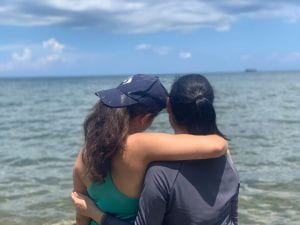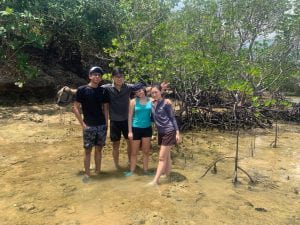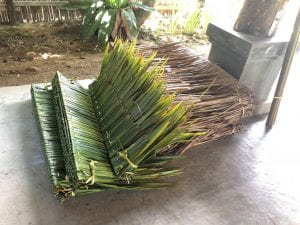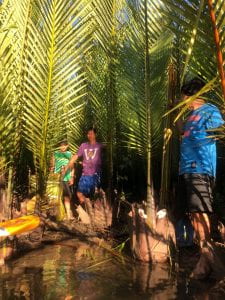Hey Hey,
After coming back from Project Week it’s time to process and think over the amazing and also extremely busy week we had. During our stay at Bohol Island, we learned about both the environment issues and the everyday lives of the locals. The main event which was driving our actions, was the 2013 Typhoon Yolanda, which was the deadliest Philippine typhoon. As a consequence of Global Warming, learning and acting in connection with it fulfils Learning Outcome 6 (Demonstrate Engagement of Global Significance).
On our first day of actions we plant a 100 mangroves. We learned about how their different species are serving different purposes. This is particularly important as the locals were planting the wrong ones for years, which couldn’t reduce the damage of the typhoons. We planted the right ones right on the coastal line to protect and strengthen it, if any further natural disaster’s taking place. It was hard after a while and more physical than we used to in the school, but I felt a kind of therapeutic effect on me. During the working hours we could talk not just to each other, but to our leaders and the locals, sharing many interesting stories and experiences. I think many times we don’t value the information we get from other people, the perspectives they contribute to our mindset about the world around us. It was special of course, but it also make me realise how I don’t need to look that far to find these unique people and views.
Overall in our trip, we approximately kayaked 25 kms. It was beautiful and with a considerate tempo, we could enjoy the charm of the nature. One of the most memorable kayaking was the firefly-looking one. A night kayaking, when we were able to see the stars above us and next to us, as the fireflies formed a blanket of stars on certain trees. It’s amazing how nature is so alluring without any human intrusion. Another edifying trip was when we met with the locals who cut the nipa palm leaves. They were talking about how it’s their financial support and how they are making rooftops out of it.
This leads to our next day service, when we learned how to make the pieces of the rooftops. Everything they used was from palm leaves and bamboo, smartly benefitting every piece of the natural resources. During the time we made the pieces we were talking to the locals about their everyday lives, universities, children, different jobs…
Later we learned how to make one of their desserts from banana, coconut, sugar, and margarin. IMG_3758 Ohh talking about food. Big highlight was the gastronomy. All the food were delicious, even though, we mainly ate chicken rice and sea food and curry.
After we kayaked to out next location on the following day, we learned how to fix the rooftop itself, and also listened interesting stories about the Typhoon and how some people could survive it. After that we made some souvenirs, saw the different use of bamboo and spent the last night in the nature. On our final night we went back to the civilisation, which was far most of the trip. We went into the city, ate in a Filippino restaurant with our guides to share our last laughters for a while.
I genuinely believe that it was a very meaning-, and impactful trip. We got so much out of it, that we couldn’t even imagine at the beginning. I highly recommend Kayakasia as a provider and the Bohol Islands as the place. Its difference from Singapore is something that worth to experience.
Thank you for making it possible for me to be there.





 to try myself on stage, doing something I have never imagined before.
to try myself on stage, doing something I have never imagined before.